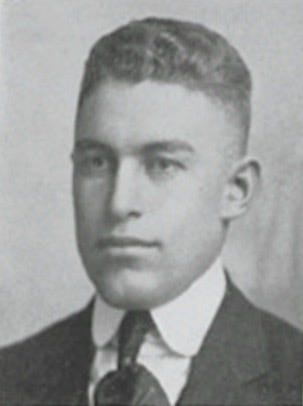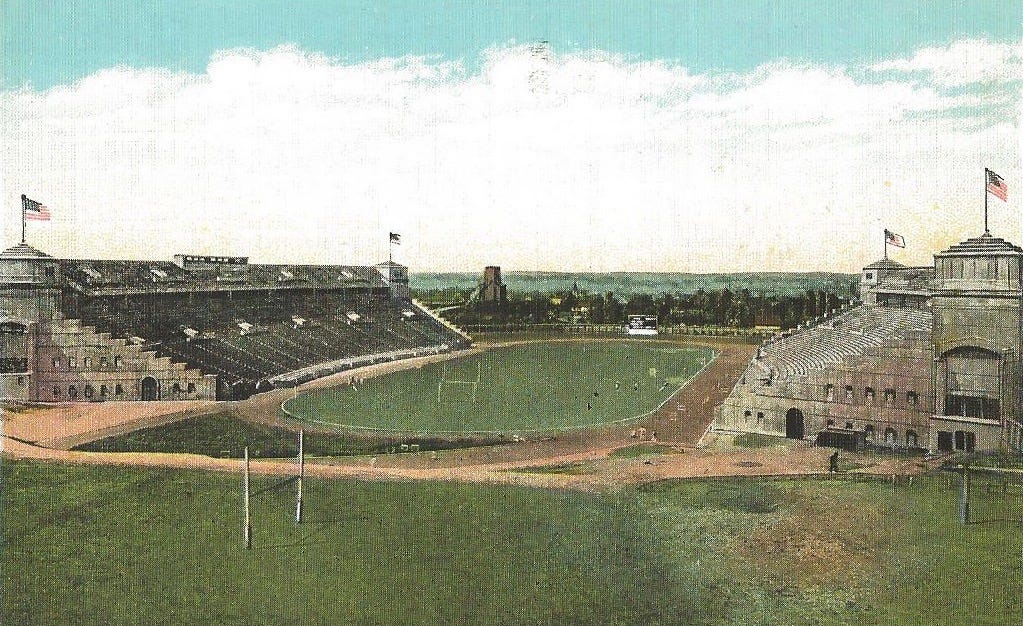Memorial Day, Nebraska, and the 1918 Football Season
The 1918 football season may have been the most bizarre in the history of the sport. As described in an earlier post, every college team was shorthanded due to many students serving in the armed forces during WWI. Beyond that, the Army effectively federalized the nation's colleges when it required all able-bodied male students to join the Student's Army Training Corps (SATC). The fall semester of 1918 saw male students wear Army uniforms, take required military classes, and in a surprise announcement in late September, had their time away from campus severely limited. The time and travel limitations meant that most scheduled football games could not occur, so teams juggled their schedules and found games with nearby colleges or military camp teams (whose travel was not restricted). If the shortage of male students and restrictions on their travel were not enough, the second wave of the Spanish Flu meant many rescheduled games were canceled or postponed as well. The Missouri Valley Conference, a forerunner of today's Big 12, canceled its season, though member schools continued to play some games.
Nebraska was a member of the Missouri Valley Conference at the time. Its captain-elect for the 1918 season, Roscoe "Dusty" Rhodes, enlisted in the spring and was sent to France with the 89th Division one month later. The team's second choice for captain also enlisted, as did their third choice, Paul Dobson, who entered the Navy and shipped to the Great Lakes Naval Training Station. Dobson quickly joined the Great Lakes football team, which ultimately finished 7-0-2, winning the 1919 Rose Bowl.
Dobson substituted in at left halfback in Great Lakes' 10-0 win over Iowa, traveled with the team to Pitt for a game canceled by Pittsburgh's health authorities, and started at left halfback in the second game of the season at Illinois, scoring the only touchdown in Great Lakes' 7-0 victory. The next week, Dobson qualified to train as a balloon pilot and transferred to MIT for ground training. It appeared his football season, and perhaps, his football career, was over.
Nebraska's football team, with only three returning starters, struggled. The Cornhuskers lost to Iowa 12-0, the week after Great Lakes beat the Hawkeyes and did not play again for five weeks as one game after another was canceled or postponed. They got back on track with victories over Omaha Balloon (an Army training camp for balloonists) and Kansas, before losing to Camp Dodge on November 23.
In Europe, the bulk of American forces finally saw action at St. Mihiel and in the Meuse-Argonne Offensive in September and October, before the Armistice went into effect on November 11. With the war over, some soldiers and sailors in training in the U.S. had the option to leave the armed services immediately. Paul Dobson took the option and returned to Nebraska
After arriving in Lincoln, Dobson learned the football team had two more games to play: a twice-postponed battle with Notre Dame and a game with conference foe, Washington University in St. Louis. Dobson rejoined the team and prepared for the Thanksgiving Day game with the Irish. However, a day or two before the game, the university community learned that Roscoe Rhodes, the player elected as team captain for 1918, had been killed in action in France.
It was with heavy, but inspired, hearts that the Cornhuskers took the field against Notre Dame. The game, played on a snowy and muddy field, saw little offense. Notre Dame, under first-year coach, Knute Rockne, threatened to score in the first quarter on a drive punctuated by George "Win One for the" Gipp and Curly Lambeau runs. Nebraska's defense held, however, and the Cornhuskers settled into playing a field position game, playing stubborn defense and punting on most first downs. Dobson punted eighteen times while Nebraska gained only nineteen yards in a game ending in a scoreless tie. A week later, the less-inspired Cornhuskers fell to WashU, 20-7.
Dobson's appearances for Nebraska likely made him the only player to start in a game for a Rose Bowl-winning team, while starting for a different team later the same season. Dobson was Nebraska's team captain in 1919 and went on to a successful business career, becoming the President of the Diamond Walnut Growers, the forerunner of Diamond of California, whose walnuts, pecans, and almonds keep us all in fighting trim.
Roscoe Rhodes was one of sixty-two Nebraska alums who died in the armed services during the war, including a Red Cross nurse who was infected with influenza while tending to soldiers during the pandemic.
Like many other schools, Nebraska dedicated their Memorial Stadium in honor of those who fell in the Civil War, Spanish American War, and WWI.
Today, let's tip our hats to those who served during WWI, other conflicts, and those on the medical front lines currently battling the coronavirus.
Click here for options on how to support this site beyond a free subscription.





